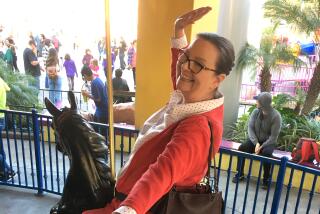Best Medicine: Dose of Home : Outpatient Procedure Helps the Healing
- Share via
ORANGE — As doctors collected blood cells for her bone marrow transplant, Barbara Delgado Garcia remembers, she watched an Ann-Margret movie about a dying breast cancer victim who must find homes for her children.
Although it wasn’t the best movie choice, Garcia today is grateful that instead of having to find new families for her 2- and 3-year-old girls, she has them for comfort and motivation as she recovers from breast cancer, thanks to an unconventional form of treatment.
The treatment, a bone marrow transplant, was unusual because Garcia received it as an outpatient.
Garcia had undergone a mastectomy, but her lymph nodes still were cancerous. Her best hope was a bone marrow transplant, an expensive proposition for the San Clemente homemaker and her husband, a maintenance worker at a Dana Point marina.
Her doctor at St. Joseph Hospital told her that Medi-Cal, which provided her insurance, was wary of paying the $150,000 for a relatively new procedure.
“Forget it,” she told him. “I can’t pay that with my whole life. I can barely pay my rent!”
The hospital and Medi-Cal agreed to share the expense, and Garcia became a trial patient for a new procedure that would cut the cost of the operation in half. The entire process, from cell collection to chemotherapy to the transplant itself, would be done on an outpatient basis.
This week, Garcia passed the danger point, when an infection can be critical for her suppressed immune system. That milestone gave the hospital the confidence to start treating other breast cancer patients on the same outpatient basis.
*
The technique is being done all over the country, according to Dr. Winston Ho, director of St. Joseph’s bone marrow transplant program and Garcia’s oncologist. Other hospitals rent rooms in a nearby hotel or college housing and have nurses stay and monitor the patients.
The equipment for this treatment is now small enough to move around, Ho said.
“The patients are home with their own families in their own comfortable settings. They get the same kind of care, just not in a hospital setting.”
In Garcia’s case, the outpatient facility was her small home, and her nurse was her terrified sister, Leticia Delgado, who flew up from Garcia’s native Mexico City.
“Poor Lettie,” Garcia said, laughing now about how scared her sister was. “She kept saying to me, ‘What if something happens to you in the middle of the night? Something will have to be done in seconds.’ ”
That “something” never happened, but Delgado, who has since returned to Mexico City, was trained for three days by hospital staff in case it had. A small computer monitor and a modem next to Garcia’s brass bed provided a lifeline to the staff. And everyday, Delgado drove her to the hospital’s outpatient clinic for treatment.
“Once breast cancer comes back after a mastectomy, it can almost never be cured,” Ho said. With bone marrow transplants, “we may be curing them.”
Ho noted that doctors so far have no proof that the procedure cures anyone, because it is only five years old.
“What we have shown is that of patients who get this treatment, many more are alive and well after five years,” Ho said.
In a breast cancer case, which differs from other cancers, patients can be their own donors for transplants, Ho said. Blood-producing cells that normally live in the bone marrow can be stimulated to go into the bloodstream and collected. Those cells are frozen and stored and are reintroduced after the chemotherapy has killed the cancerous cells in the body.
On the 27th day of her treatment, the day of the transplant, Garcia was still sick from the chemotherapy.
She lay down and the staff started introducing the frozen healthy cells through her catheter.
“Did you ever see ‘The Exorcist?’ ” she asked. “That’s the way you feel.”
She slept for four hours and swore she could feel the difference when she awoke, even though the doctors told her that was impossible.
“As soon as I woke up, I feel stronger and alive,” she said. “I was more alert. I told the doctor I feel like I’m born again.” The doctor said they would have to wait 21 days to make that determination.
July 15 marked the day the doctors could agree with her.
“She has gone through this safely, soundly and she is fine,” Ho said. “Her treatment is over.”
Last Monday, Garcia made her first trip to the supermarket and has since taken the girls to the park and the beach. And on Aug. 12, she will celebrate her 37th birthday.
“I’m happy,” she said. “I’m very, very, very happy.”






